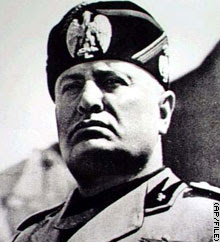I found that Libya is definitely a Totalitarian country especially when Qaddafi seized power and up until his death on October 20 2011. I found that Libya is a Totalitarian Country because it was actually illegal to even set foot there until recently. This place is filled with oppression. You cant escape the state without leaving the country or going off road and into the desert. Apparently the Informers and secret police are omnipresent and all but omniscient. No one can travel from one city to another without a thick stack
of permits and papers. There are propaganda posters and billboards
literally everywhere, even alongside roads in the wilderness where
nobody lived. State propaganda is even carved into the sides of the
mountains. Pictures of Qaddafi hang inside every building, and an entire
floor of the museum in the capital is dedicated to glorifying him
personally. Libya even looks like a communist country, with its
Stalinist tower blocks outside Tripoli’s old city center and its
socialist-realist paintings depicting happy proletarians in their
Workers’ Paradise.
I read that that this girl recently went there and this is what she had to say about the place was that no one that she met would talk about politics and if there was the slightest chance that someone would there is a high chance of being over heard. Those who did open up when they were
safely in private were unanimous in their hatred, fear, and loathing of
the regime. And they made sure to tell her that their entire families
would be thrown in prison if she had repeated what they said to anyone.
I found that Cuba is also a totalitarian country. Raul, 80, the younger brother of frail Fidel, 85, has generally
maintained his sibling’s legacy of repressive leadership. Raul was named
acting President of the Council of State of Cuba in July 2006, assuming
presidential duties, and he was officially elected president of Cuba in
2008. The Communist Party of Cuba controls all aspects of the
government, and there is no free press. The island nation’s 11.3 million
citizens are not allowed to leave the country without permission, which
is often denied. However, the number of political prisoners has
decreased significantly in the last couple of years, and Raul has
introduced some economic reforms, including privatizing some
agricultural land and other real estate. Yet unjustly punitive laws
persist, including a selectively-enforced prohibition on the
unauthorized assembly of more than three people, which is punishable
with up to three months in prison and a fine, and a “dangerousness”
provision that allows the government to imprison people who seem like
they might commit a crime in the future. The total number of political prisoners is unknown
because the government does not disclose such information and keeps its
prisons off-limits to human right organizations. The government incarcerates people for their peaceful political beliefs and activities. Workers lose their jobs because of their political beliefs and the
law does not allow
Cuban workers to form and join unions of their choice. Salaries are not
high enough to meet food and clothing costs. Despite the
government’s decision to permit Cubans to purchase personal computers,
access to the Internet is strictly controlled and given only to those
who are considered trustworthy. The
government also restricts freedom of movement and prevents some citizens
from emigrating because of their political views. The government is tasked with
monitoring, infiltrating, and controlling the country's human rights
community.
I also found that Turkmenistan is another totalitarian country.Gurbanguly Berdymukhammedov, a trained dentist, once cleaned the teeth of predecessor, Saparmurat
Niyazov. In 1997 he was appointed minister of healthcare and medical
industry, and he became president in 2006. Although Berdymukhammedov had
vowed to dismantle Niyazov’s cult of personality, experts say he has
simply replaced it with one of his own. Portraits of the 54-year-old
leader are displayed all over the capital. Displaying Soviet-style
paranoia and brutality, government security forces ruthlessly hunt down
and arrest anyone suspected of dissent. Political opposition is not
tolerated. The government controls the media, blocking access to
websites they deem objectionable and confiscating any foreign literature
at the airport that is brought in by visitors. Because human rights
groups are reportedly forbidden to enter the country, it’s unable for
the outside world to assess how good or bad conditions really are.


































